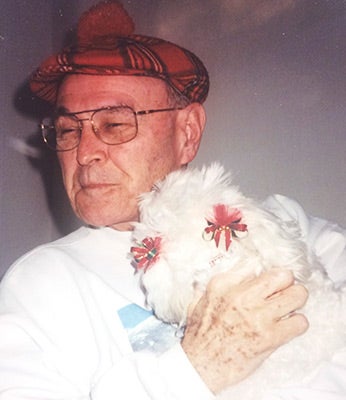Art, music therapy trigger memories for dementia patients
Published 3:07 am Thursday, June 29, 2017

- Jerry Hall with his beloved dog
Florala Health and Rehab was awarded a rollout grant last October for a program to help patients suffering from dementia, and patients are already reaping the rewards.
The grant from the Centers for Medicare and Medicaid Services, was to take people with dementia and reintroduce them to music and arts.
Twice each week, patients get to participate in a music and art program from the company Alzheimer’s Education, Resources and Services.
Sally Hall’s husband, Jerry, is a dementia patient at the facility.
Hall said her husband was diagnosed with dementia some six or seven years ago.
He’s been working through the new program and Hall said she’s already seeing fruits of the program.
“While waiting in the hall for a nurse, I was entertained by staring at each precious art piece hung on the walls by the patients,” she said. “Because I didn’t have my glasses on at the time, I didn’t realize it was Jerry’s art work before me until a passing nurse made a comment. I knew immediately what he had in mind when painting this little white dog.”
Hall said she nearly jumped out of her shoes and told the nurse, “Oh, my goodness, you don’t realize what this means to Jerry.”
“She immediately wanted to hear the story, then she pulled in another nurse and yet another until five CNAs and nurses encircled the art,” Hall said “Readers might recall Jerry had a cute little white Maltese named Cassie who sat in the crook of his left arm wherever he traveled. When I located photos of Cassie at home, I saved them for my return visit.”
Hall said when she returned she told more people the story of Cassie.
“All were in awe at the similarity of his painting to the photo of his own dog,” she said. “When I showed Jerry the photos of Cassie you simply couldn’t imagine the joy he ecstatically displayed with smiles and laughter for the rest of the visit. He had a return visit with his puppy and with the grip on those photos, there was no way I was getting them back.”
Hall said she calculated that it was at least 12.5 years since Jerry last saw Cassie.
“Memories are there, my friends,” she said. “They might need to be stimulated to get to the surface. We marveled not only at the fact that he remembered how Cassie looked in detail, but that he remembered.”
Hall said she’s pleased with the results.
“I’m seeing a definite, fresh response,” she said.
Jerry, who was a local pharmacist, has Lewy Body Dementia, and can’t walk for feed himself.
Hall acknowledged that dementia is difficult, but offered some advice for those who have loved ones dealing with it.
“Never give up,” she said. “More data is still stored in the brain than we can ever believe possible, and we never know what will trigger them. Here’s what I suggest for you. Retell stories. Patiently play a game, hold hands, take a walk, show them photos, display affection, bring them fruit. In other words, appeal to their senses. If a patient shows signs of agitation and doesn’t seem to want you to be there that day. Leave. Another visit will be better, I promise. Don’t get your feelings hurt and go on to something different. This time in life, we must realize, it’s not about us. It’s all about them.”
Sara Goolsby, administrator at Florala Heath and Rehab, said that the residents have been fortunate to have the program.
“We don’t just give up on people,” she said.
Goolsby said when she found out the Halls’ story, it brought tears to her eyes to know that he was expressing his love through art.





